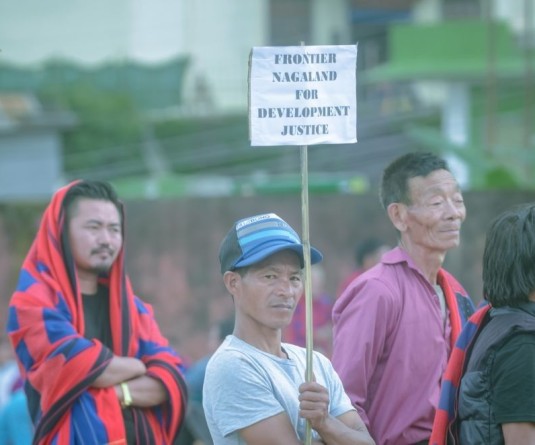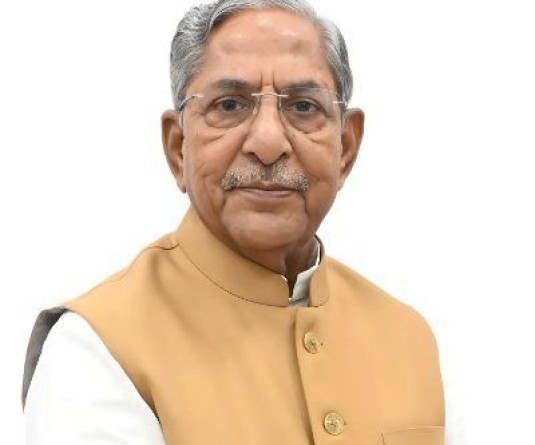
2nd National Peace Convention underway in Dimapur
Morung Express News
Dimapur | January 31
Peace is not just an idea but comes with people becoming different. Which is why peace, like war, is waged. Putting these thoughts into perspective were Naga peace stalwarts, Niketu Iralu and Dr. Wati Aier, speaking alongside US-based Dr. Paul Bueno De Mesquita, on Sunday, at the 2nd National Peace Convention underway at Hotel Acacia here from January 30-February 1. The Convention has been organised by the National Peace Movement in collaboration with Rotary International Dist. 3040 & 3240, NEISSR, Peace Channel, Universal Solidarity Movement and other NGOs.
Session I
“In the north-east, our struggle is for a wider common stability which will enable us to understand one another and move forward together,” said Peace Activist Niketu Iralu speaking on ‘Peace and Conflict resolution in the context of North East India’ during the first session of the second day of the Convention.
“Our history deserves to be respected—to stand by our rights does not mean that we are against India,” he re-iterated of the Naga struggle, highlighting the values of an “honourable solution” which will allow for India and the Nagas to be “honourable neighbours.”
In that, Iralu called for the “perception gap” of understanding the roots of conflict in the region to be bridged in order for problems to be resolved in a holistic manner. Both the Naga people and the Indian people will need to work hard to bridge this gap, but once done, will lead to peace. “Peace is not just an idea but it is people becoming different,” he noted.
Contributing to the discourse, MK Gandhi’s great grandson, Tushar Gandhi, asked the audience to refrain from applying terms like “rebels” and “insurgents” to the Nagas as it creates trust deficit. Asking people to be “more sensitive” towards the Naga struggle, he noted that this will create the space for reconciliation between the Indian and Naga people.
Calling for the “rejection of violence,” Niketu Iralu asserted that any political solution arrived at between India and Naga national groups should be implemented “together, with non violence.” If the Government of India can implement such a peace pact with non violence, along with all sections of society, it would be a great gesture towards peace.
This would be a gargantuan task, but “peace, like war, is waged,” said Convenor of the Forum for Naga Reconciliation, Dr. Wati Aier, speaking as the Chair for the session. Today, as people are increasingly divided on the lines of race, tribe or ethnic identity, it is pertinent to device “unconventional methods” of bringing peace as conventional ways have become obsolete.
“The boundaries that make identities should be permeable. They should not result in war but in working with each other,” he maintained of the FNR position on the matter.
For Dr. Paul Bueno De Mesquita from the Centre of Non Violence and Peace Studies at the University of Rhode Island, US, such messages of peace and non violence are “critically important for the development of inclusive communities that entail liberty and justice for all.”
While in the US, “our culture has been seduced by violence,” there has been a decline in violence on a global level, he informed, as “new ways of unarmed struggle to achieve justice have emerged.” He was speaking on ‘Peace Building from an International Perspective.’
Highlighting Martin Luther King, Jr.’s work on non violence and peace, Dr. Mesquita listed out the principles that can be applied to “institutionalise and internationalise” non violence. These include courage, targeting systemic forms of violence, strategising non violence by focussing on goals, justice, reconciliation etc.
Session II
Speaking on the topic, ‘Human Development and promotion of Peace’, PV Rajgopal, a social activist and Gandhian, spoke on the need of getting young people involved in action towards peace building. He stressed that a Convention of this kind should motivate individuals for a better change.
It is ironic, he said, that a nation which considers Mahatma Gandhi as the Father of the Nation has been celebrating his memories while the nation is filled with poverty, degenerated by poverty, discrimination, injustice and exploitations.
Also speaking during this session, Anuradha Shankar IPS, ADGP Railways (MP) stressed on the difference between duties and responsibilities. She noted that duty is assigned while responsibilities are taken up by the individual of his or her own accord, while speaking in the context of rights in nation states.
Session III
Dr. Jill Carr-Harris, a social activist in Asia and Africa, talked on ‘Economic empowerment & justice to the marginalized’ and former pro-vice chancellor, Nagaland University, Prof. A Lanunungsang Ao, discoursed on ‘Relevance of Mahatma Gandhi in the socio-political scenario of India.’
Dr. Jill narrated the role played by rural Indian women at the grassroots level and how their fight to protect forests, their source of livelihood, from exploitation by the government caught national attention. She also said that struggle and dialogue are the basis of a non-violent movement.
On peace, Dr. Jill said Mahatma Gandhi saw peace as an everyday reality and not a future possibility. Prof. Lanunungsang said everybody talks about Gandhi and his non-violent principles but few actually practice it. Likewise, even though Nagas profess themselves as Christians, a majority of them do not practice Christian principles and morality.
He said the real threat to India is not external but internal, exhibited in the form of religious divide and intolerance, and stressed on Gandhian principles of selflessness, non-attachment and “non-greediness” for peaceful and harmonious living.
Writer and social activist, Khekiye K Sema, who chaired the third session, highlighted to delegates from mainland India the genesis of the Naga movement and how in the protracted struggle, Nagas witnessed untold suffering and violence. “You can hope for peace but also force into violence,” he said.
Iterating the justness of the Naga political movement, Sema said that India too has learned a lesson from the Naga struggle – that violence is not the answer.
Panel Session
How can the news media promote values of justice and peace? With that question, panellists Dr. Aküm Longchari, Editor of The Morung Express and Tiamerenla Monalisa Changkija, Editor of Nagaland Page embarked on a discussion on the ‘Role of Media in Peace Building;’ the session chaired by Dr. Jacob Kani, Editor of Youth Action. For the media to play that role, the reframing of issues may be necessary, maintained Dr. Longchari. By “re-defining” the issues, the media must be able to re-frame for each party, the interest of the other.
People must be allowed to define their own issues, and the media should create the space for truth telling. The media, he noted, can avoid becoming a tool of psychological warfare and counter insurgency. To establish the natural link between justice, peace and human security, the media needs to raise critical consciousness through the paradigm of a shared imagination—one that involves reconceptualising time from future to past to present.
The fourth estate should be the place where peace is made; where conflicts can be brought forth, discussed and solutions found, said Changkija. However, technology today has reduced the ‘fourth estate’ to the ‘media,’ thereby taking away values of journalism and democracy from it. Readers talk more about circulation instead of character and content, thereby reducing media houses to mere businesses, she maintained, which has contributed in equal measure to the media ignoring ‘peace building.’





